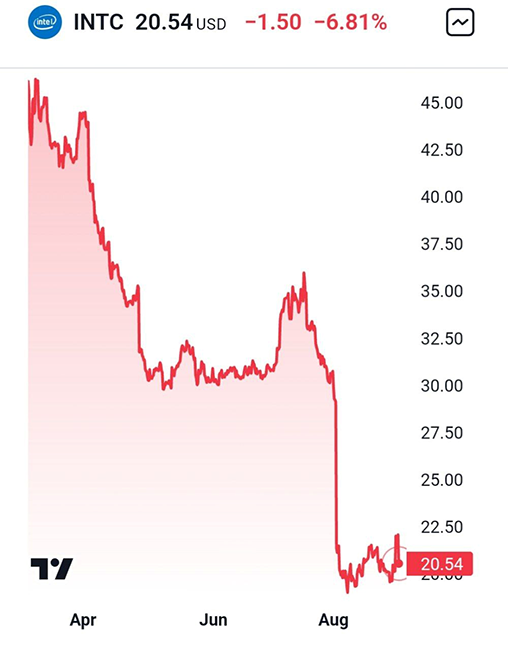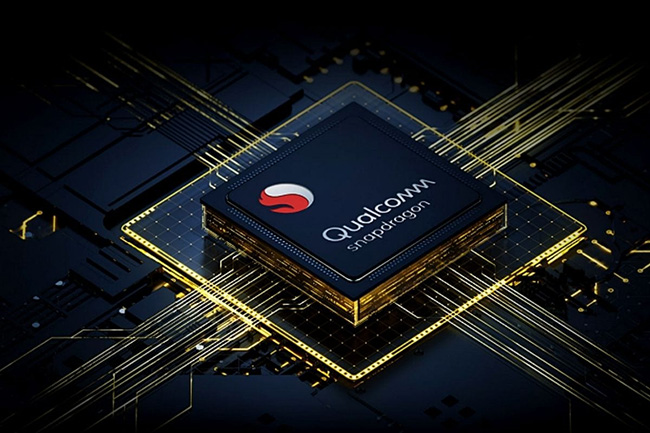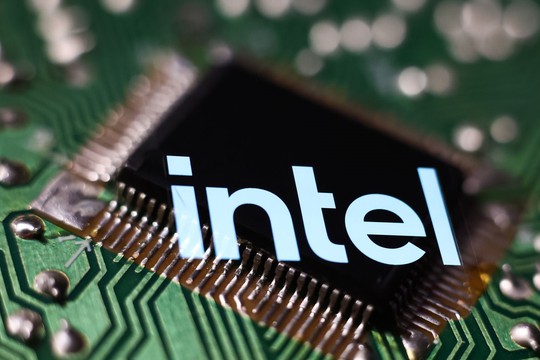Photo: Getty Images
Intel's reported discussions with bankers about its future could call into question the company's ambitions to double down on U.S. chip manufacturing.
Why it matters: The company is slated to receive the largest parcel of federal government support to expand domestic manufacturing as part of the CHIPS Act.
Driving the news: Intel is said to be kicking around ideas with Goldman Sachs and Morgan Stanley, including a sale or spinoff of its manufacturing unit, per Bloomberg.
It's also considering smaller moves like reining in project expansion plans, people familiar with the situation told Bloomberg.
"We don't have a comment on this," Intel's director of corporate comms Penny Bruce says in an email to Axios on the reported talks with advisers.
When asked whether the status of its manufacturing projects had changed, she declined to comment beyond an April 15 update.
The big picture: Intel reported a $1.61 billion net loss last quarter, complicating the company's ambitions to spend tens of billions on new factories to make chips for itself and outside customers.
One problem, it's not clear whether any customers have lined up.
Up to $8.5 billion in direct funding and up to $11 billion in loans pledged to the company through the CHIPS Act to advance manufacturing projects is partly dependent on the company hitting production milestones.
Between the lines: Discussions around a new direction reportedly gained more urgency following that earnings report at the start of the month.
Sales for Intel's data center business, once its most profitable, fell 3% to $3 billion as industry demand has shifted to AI processors (Nvidia's wheelhouse).
The company also said it would lay off over 15% of its staff this year to help reduce costs.
Zoom out: Intel has been floundering for over a decade, and some of the larger options reportedly being discussed would unwind core parts of CEO Pat Gelsinger's turnaround plans centered on a recommitment to manufacturing.
Intel's stock's been moving in the wrong direction. It's down nearly 60% this year and 28% just this month — failing to capture the momentum other chip stocks have enjoyed.

Chip maker Intel said that it plans to lay off 15,000 people, a troubling sign for the Biden administration’s multibillion-dollar plan to rebuild the U.S. chip manufacturing industry, ‘The Washington Post’ informs.
The layoffs will affect more than 15 percent of its workforce, Intel said. The announcement came as Intel CEO Pat Gelsinger told investors and staff that the company needed a massive restructuring to slash costs after posting a $1.6 billion loss in the second quarter.
Intel’s annual revenue fell by $24 billion from 2020 through 2023 even as its workforce grew 10 percent, a trend that Gelsinger called unsustainable. “This is painful news for me to share,” he wrote in a note to employees.
The majority of the layoffs will be completed by the end of the year, Intel said.
“These cuts are bigger than I would have expected, especially when the company hired so many people for the last few years,” said Patrick Moorhead, founder of Moor Insights & Strategy.
Other companies have surpassed Intel in multiple areas over the past several years. The company failed to establish itself in mobile devices as smartphones took off in the 2000s, started losing ground in PCs and data centers to Advanced Micro Devices in the late 2010s, and now trails far behind Nvidia in the red-hot artificial intelligence sector.
But those Intel rivals mostly have their chips manufactured overseas, largely by Taiwan Semiconductor Manufacturing Co. Intel had emerged as the big winner of President Biden’s Chips for America program, with the administration announcing $8.5 billion in grants and $11 billion in loans for the company this year to help bring some manufacturing operations back to the United States.
The Biden-backed Chips and Science Act of 2022, which allocates $52 billion in grants and $75 billion in loans to support the domestic chip industry, has been praised by U.S. executives as transformative, with Gelsinger calling it “the most important piece of industrial policy since World War II.”
But there have also been skeptics. Chips are a notoriously brutal industry, requiring billions of dollars of investments. Even if Intel ultimately gets federal money for expansion, its U.S.-based factories will continue to face higher labor costs than peers in South Korea, Taiwan and China.
Gelsinger said in March that Biden was pushing him to get the new federally funded factories up and running faster, and that Commerce Secretary Gina Raimondo “now has sales targets for me.”
Microsoft recently followed Apple’s lead in ditching Intel chips for its latest slate of consumer hardware, including the Surface Laptop and Surface Pro, and launched its Copilot Plus PC initiative exclusively with Qualcomm, without waiting for Intel (or AMD)’s new flagship laptop chips to join them. Intel is currently dealing with two generations of potentially defective desktop CPUs, though the company currently believes it can mitigate the issue with a software update and doesn’t currently plan recalls.
On the company’s earnings call today, Intel CFO David Zinsner just suggested that the company’s next flagship AI laptop chip, Lunar Lake, won’t be enough by itself to turn things around.

Qualcomm is interested in Intel’s PC business, a source says.
Qualcomm (QCOM.O), opens new tab has explored the possibility of acquiring portions of Intel's (INTC.O), opens new tab design business to boost the company's product portfolio, according to two sources familiar with the matter.
The mobile chipmaker has examined acquiring different pieces of Intel, which is struggling to generate cash and looking to shed business units and sell off other assets, the people said.
The $184 billion Qualcomm, which is known for chips found in smartphones and counts Apple (AAPL.O), opens new tab as a customer, has been working on plans to buy pieces of Intel for months. Qualcomm’s interest and plans have not been finalized and could change, according to the sources.
Intel reported a disastrous second quarter last month, which included a 15% reduction in its staff and a pause on paying dividends. Executives are grappling with how to continue to fund the company’s manufacturing plans and generate cash.
Its PC client business revenue dropped 8% to $29.3 billion last year, amid overall weakness in the PC market.
Once known for its "Intel Inside" marketing campaign, Intel’s client group makes laptop and desktop chips used in machines around the world. Executives have said the introduction of artificial intelligence PCs will drive consumers to upgrade their computers and generate more sales.
Qualcomm generated $35.82 billion in overall revenue in its last fiscal year.
read more in our Telegram-channel https://t.me/The_International_Affairs

 9:08 08.09.2024 •
9:08 08.09.2024 •























